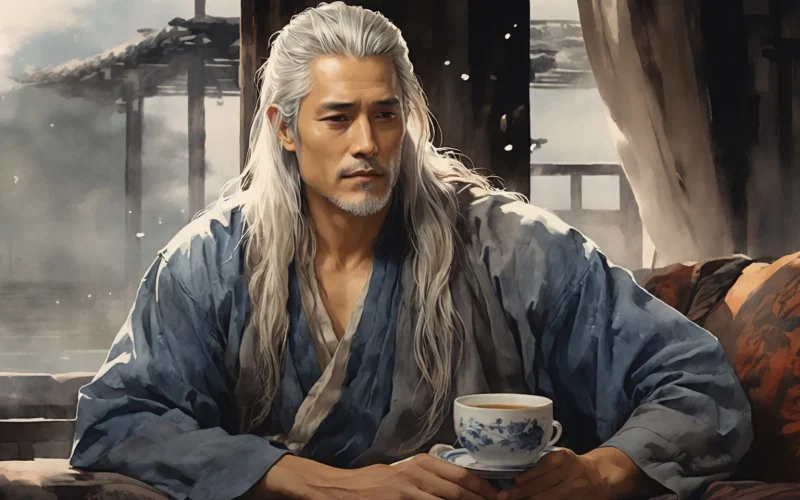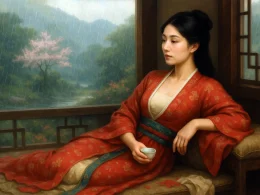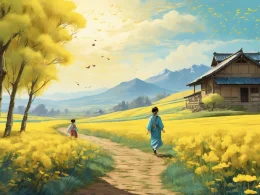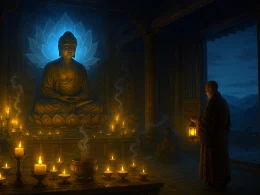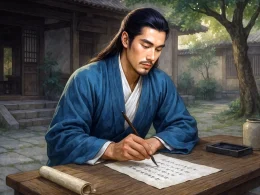The streets burst with sights to cheer the eye,
Before silk lanterns rise, steeds neigh nearby.
This white-haired recluse lacks attendants' train -
Just a lass perched on my shoulder, nothing more to gain.
Flowers flood the market square,
Moonlight soaks through clothes I wear.
Young love's affairs now taste of pain,
As old age grips my heart again.
On Sand-River's banks, spring chill stays light,
I watch the crowd drift home through fading light.
Original Poem
「鹧鸪天 · 正月十一日观灯」
姜夔
巷陌风光纵赏时,笼纱未出马先嘶。
白头居士无呵殿,只有乘肩小女随。
花满市,月侵衣,少年情事老来悲。
沙河塘上春寒浅,看了游人缓缓归。
Interpretation
Composed in the first month of 1197 when Jiang Kui, then forty-three, had moved his family to Lin'an under the patronage of Zhang Jian. As the Lantern Festival approached, the capital's streets already shimmered with pre-celebration lights. Venturing out on the eleventh day, the poet found himself amidst the luminous spectacle—lantern shadows intertwining, crowds surging—a scene that stirred memories of bygone affections and reflections on his life's journey. Written to the tune of "Partridge in the Sky," a lyrical form with fifty-five characters in two stanzas, this piece blends precise tonal patterns with vivid imagery, using the lantern-viewing scene to express profound personal emotion.
First Stanza: "巷陌风光纵赏时,笼纱未出马先嘶。白头居士无呵殿,只有乘肩小女随。"
Xiàng mò fēngguāng zòng shǎng shí, lóng shā wèi chū mǎ xiān sī. Báitóu jūshì wú hē diàn, zhǐyǒu chéng jiān xiǎo nǚ suí.
The lantern-lit streets invite revelry—
Silk shades unlit, yet steeds neigh impatiently.
This white-haired recluse has no retinue,
Just a girl perched on my shoulders, laughing through.
The stanza opens with the vibrant festival scene. "Steeds neigh impatiently" (马先嘶) captures the ostentation of the elite, their eagerness palpable even before the lanterns glow. In stark contrast, the self-deprecating "white-haired recluse" (白头居士) appears solitary and unheralded. The "girl on my shoulders" (乘肩小女)—perhaps a neighborhood child or a street performer—adds a touch of whimsical poverty, revealing the poet's ability to find grace in humility, his playful spirit undimmed by circumstance.
Second Stanza: "花满市,月侵衣,少年情事老来悲。沙河塘上春寒浅,看了游人缓缓归。"
Huā mǎn shì, yuè qīn yī, shàonián qíngshì lǎo lái bēi. Shā hé táng shàng chūn hán qiǎn, kànle yóurén huǎnhuǎn guī.
Flowers flood the lanes, moonlight soaks my sleeve—
Youth's passions remembered, old age's grief.
By Shahe Pond, spring's chill lingers light;
I watch the crowds drift home through the night.
Here, the poet turns inward. "Flowers flood the lanes" (花满市) and "moonlight soaks my sleeve" (月侵衣) paint a dazzling scene that only heightens his melancholy. "Youth's passions remembered" (少年情事) hints at loves and losses left unspoken, the weight of time pressing heavily. The closing image—observing the crowd's dispersal by Shahe Pond—casts the poet as a solitary figure against the receding festivity, the "lingering chill" (春寒浅) mirroring his quiet sorrow. The stanza masterfully employs the "joyful scene to amplify sorrow" (乐景写哀), leaving the ache of memory palpable beneath the luminous night.
Holistic Appreciation
Though titled "Viewing the Lanterns," this lyric poem (词) is ultimately a meditation on the solitude of old age and the melancholy of faded emotions—with the festive clamor serving merely as a backdrop. With delicate brushstrokes, Jiang Kui paints the dazzling spectacle of Lin’an’s Lantern Festival, only to contrast it with his own isolation, sharpening the ache of loneliness. The "neighing horses" versus the "white-haired recluse" reveal the clash between worldly extravagance and an idealist’s quiet austerity. The line "Youth’s passions now are aged sorrow" becomes the emotional climax, laying bare the poet’s lament for bygone loves and forsaken dreams.
The tone is restrained yet piercing, its grief veiled beneath a serene surface. Ostensibly a festival scene, the poem is in truth a vessel for introspection—where joy is tinged with sorrow, and revelry underscores solitude. The closing image of "crowds drifting slowly home" mirrors both the night’s quiet dissolution and the poet’s sinking heart: all returns to silence, leaving only him to face the dying lanterns and the indifferent moon.
Artistic Merits
- Interweaving tangible and intangible: The poem depicts concrete scenes—lantern-lit streets, dispersing crowds—yet suffuses them with inner desolation, using the external to mirror the internal. Contrasts like "attendants’ shouts" versus "girls perched on shoulders," or "streets drowned in blooms" versus "aged sorrow," heighten the tension between isolation and festivity.
- Precise language, emotion beneath frost: Jiang Kui’s signature "clear emptiness and subtle depth" shines here. The diction is deceptively plain, its power coiled in implication rather than declaration. This is a masterclass in "using joyous scenes to convey grief"—where every image carries unspoken weight.
- Layered symbolism: The "veiled lanterns," "horses’ neighs," "shoulder-riding girls," "flower-choked streets," and "lingering spring chill" are more than vivid tableaus. They serve as metaphors for social stratification, personal vicissitudes, and emotional transience, enriching the poem with resonant, lingering meaning.
Insights
This work reveals how even amid radiant lanterns and jubilant throngs, one may remain adrift in memory and solitude. It reminds us: worldly joy is fleeting, and for those burdened by loss or exile, the height of festivity can deepen the ache of absence. The poem teaches us to meet life’s loneliness and regrets with grace—while acknowledging that no festival’s glow can dispel the shadows within. True clarity and warmth endure only for those who confront their inner truth, even as the revelry fades to silence.
About the poet
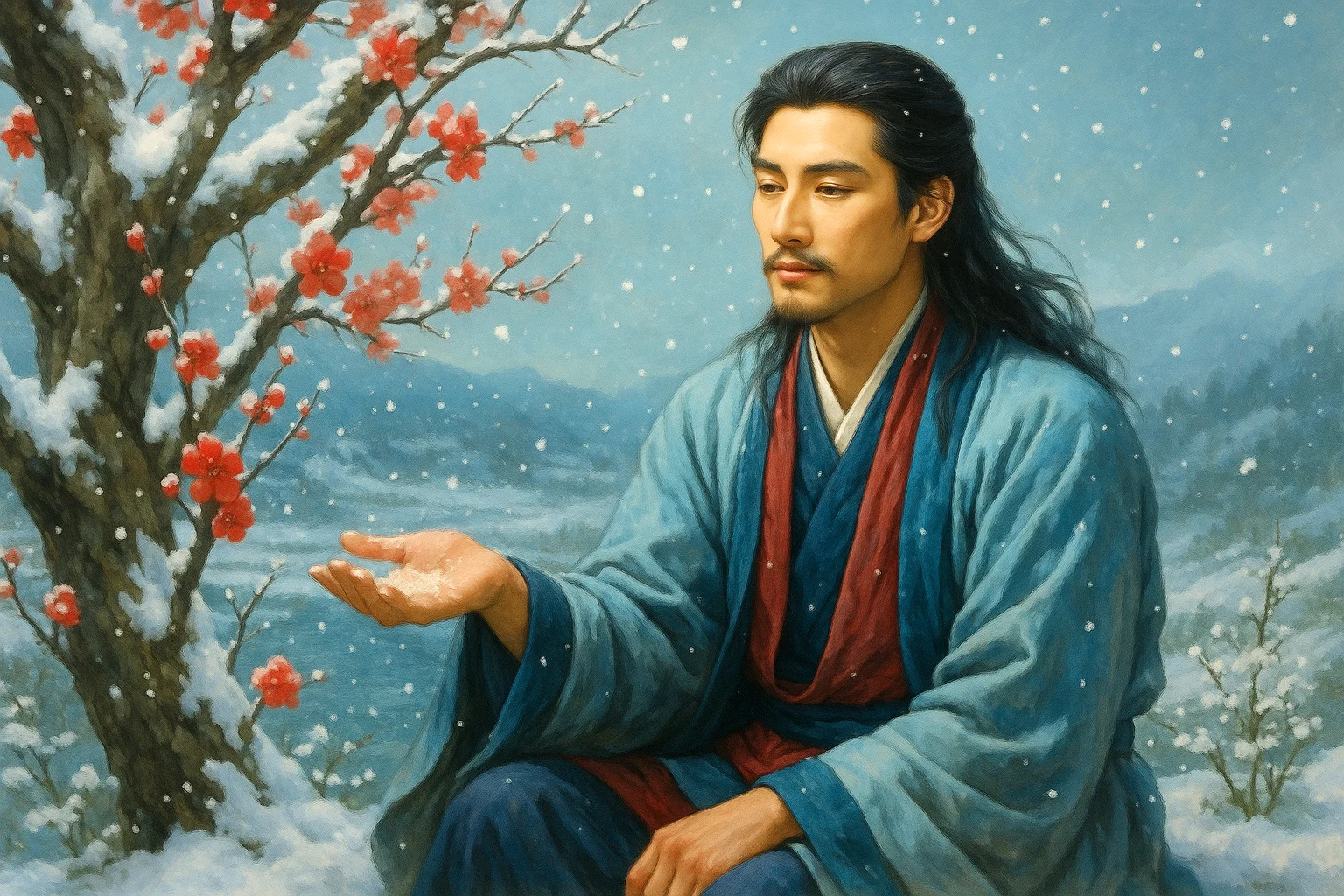
Jiang Kui (姜夔, c. 1155 - 1221), a native of Poyang, Jiangxi, was a Southern Song Dynasty lyric poet and musician. He remained a commoner throughout his life. His lyrics are known for their ethereal and austere style, and his poetry is also highly regarded. Along with Fan Chengda and Yang Wanli, he is celebrated as one of the "Four Great Masters of the Restoration."







